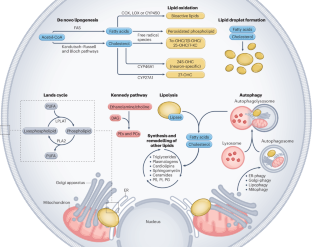Lipid metabolism, remodelling and intercellular transfer in the CNS
IF 26.7
1区 医学
Q1 NEUROSCIENCES
引用次数: 0
Abstract
Lipid metabolism encompasses the catabolism and anabolism of lipids, and is fundamental for the maintenance of cellular homeostasis, particularly within the lipid-rich CNS. Increasing evidence further underscores the importance of lipid remodelling and transfer within and between glial cells and neurons as key orchestrators of CNS lipid homeostasis. In this Review, we summarize and discuss the complex landscape of processes involved in lipid metabolism, remodelling and intercellular transfer in the CNS. Highlighted are key pathways, including those mediating lipid (and lipid droplet) biogenesis and breakdown, lipid oxidation and phospholipid metabolism, as well as cell–cell lipid transfer mediated via lipoproteins, extracellular vesicles and tunnelling nanotubes. We further explore how the dysregulation of these pathways contributes to the onset and progression of neurodegenerative diseases, and examine the homeostatic and pathogenic impacts of environment, diet and lifestyle on CNS lipid metabolism. Within the CNS, lipids have vital roles in numerous cellular functions and the maintenance of lipid homeostasis is essential for brain health. Bogie and colleagues explore the mechanisms that regulate lipid biogenesis, metabolism and remodelling in the CNS, the transfer of lipids between different CNS cell types and the impact of loss of lipid homeostasis in neurodegenerative diseases.


中枢神经系统的脂质代谢、重塑和细胞间转移
脂质代谢包括脂质的分解代谢和合成代谢,是维持细胞稳态的基础,特别是在富含脂质的中枢神经系统内。越来越多的证据进一步强调了神经胶质细胞和神经元内部和之间的脂质重塑和转移作为中枢神经系统脂质稳态的关键协调者的重要性。在这篇综述中,我们总结和讨论了涉及中枢神经系统脂质代谢、重塑和细胞间转移的复杂过程。重点强调了关键途径,包括介导脂质(和脂滴)的生物生成和分解、脂质氧化和磷脂代谢,以及通过脂蛋白、细胞外囊泡和隧道纳米管介导的细胞间脂质转移。我们将进一步探讨这些通路的失调如何促进神经退行性疾病的发生和发展,并研究环境、饮食和生活方式对中枢神经系统脂质代谢的稳态和致病影响。
本文章由计算机程序翻译,如有差异,请以英文原文为准。
求助全文
约1分钟内获得全文
求助全文
来源期刊

Nature Reviews Neuroscience
NEUROSCIENCES-
自引率
0.60%
发文量
104
期刊介绍:
Nature Reviews Neuroscience is a multidisciplinary journal that covers various fields within neuroscience, aiming to offer a comprehensive understanding of the structure and function of the central nervous system. Advances in molecular, developmental, and cognitive neuroscience, facilitated by powerful experimental techniques and theoretical approaches, have made enduring neurobiological questions more accessible. Nature Reviews Neuroscience serves as a reliable and accessible resource, addressing the breadth and depth of modern neuroscience. It acts as an authoritative and engaging reference for scientists interested in all aspects of neuroscience.
 求助内容:
求助内容: 应助结果提醒方式:
应助结果提醒方式:


